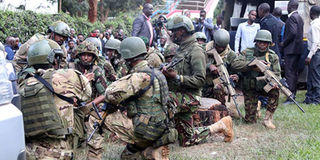West reaffirms solidarity in war on terror after Dusit attack

Special forces at Dusit hotel in Nairobi where there was a terrorist attack, on January 15, 2019. The US has expressed its solidarity with Kenya in the war on terror. PHOTO | JEFF ANGOTE | NATION MEDIA GROUP
What you need to know:
- Following criticism over advisories, the diplomats have been trying to strike a balance between their national interests and a possible backlash.
- Somali President Mohammed Farmajo condemned the attack and assured Kenya of continued cooperation.
Kenya’s Western partners in the war against violent extremism have called for a cautious approach in the wake of the attack on Dusit hotel in Nairobi.
Aware of the backlash they drew when they issued travel advisories after earlier attacks, the United States, the United Kingdom and the European Union (EU) this time supported Kenya's security agents as they battled terrorists at the hotel.
“We commend the courage of Kenyan security services actively working to end the attack. The US Mission is in close communication with Kenyan authorities and is providing assistance.
"All mission personnel are safe and we stand ready to assist US citizens in need,” Mr Robert Godec, the outgoing US ambassador, said.
His country has in the past supported Kenya’s security agencies with equipment, intelligence and border security, as well as targeted drone attacks on Al-Shabaab militants in Somalia.
SOLIDARITY
Meanwhile, UK High Commissioner Nic Hailey said in a video message: “Our team has been working throughout the night to support the Kenyan security forces and British nationals who might have been caught up in the attack.”
He confirmed that one Briton had been killed in the incident.
And, during a visit to Nairobi in August last year, British Prime Minister Theresa May pledged financial support for the Africa Union Mission in Somalia (Amisom), a 3,664-man continental military deployment, of which the Kenya Defence Forces are a part.
The US and the UK annoyed President Uhuru Kenyatta when they promptly issued travel advisories following previous attacks on Kenya.
They have since scaled down the advisories to specific areas in Lamu, the Northeastern region and Eastleigh in Nairobi.
TOURISM
Following criticism over the advisories, the diplomats have been trying to strike a balance between their national interests and a possible backlash.
For instance, the UK Foreign Office insists it is its duty to advise its nationals for their safety, but the decision to travel is entirely personal.
The UK, US and Germany (a member of the EU) are Kenya’s largest source of tourists.
In 2017, the country earned Sh120 billion from tourism, a large chunk of it from foreign visitors.
A spokesperson for the European Union said the bloc “has been, and will continue to be, at the Government of Kenya’s side in these efforts, and at the side of Kenya’s citizens”.
“Kenya’s stand against terrorism at home and abroad is a necessary fight against a challenge that we all face — be it in Africa, Europe or the rest of the world — which will contribute to bringing peace, stability and prosperity to the country, the region and beyond,” the EU said in a statement.
SHABAAB
The identities of the attackers, who were felled by special forces, were not immediately revealed.
But Somali President Mohammed Farmajo, aware that Al-Shabaab had taken responsibility, condemned the attack and assured Kenya of continued cooperation.
“Our thoughts and prayers are with the government and the people of Kenya at this tragic time. Kenya is an important ally and a brotherly neighbour. Such heinous acts only serve to embolden our joint quest to vanquish terror,” he said.
Al-Shabaab is based in Somalia, although its fighters also come from neighbouring countries as well as overseas.
Mr Farmajo’s government has been steadied by Amisom, which plans to withdraw by 2020.
FUNDING
African Union Chairperson Moussa Faki Mahamat said the attack signals a need to intensify the fight against terrorism.
“The AU stands in solidarity and grief with the people and government of Kenya in condemning this cowardly attack, which underlines the need to redouble our efforts to combat terrorism on the continent.”
The EU used to fund Amisom to the tune of Sh2.3 billion per month, but the organisation has since cut the funding due to its other security challenges.





